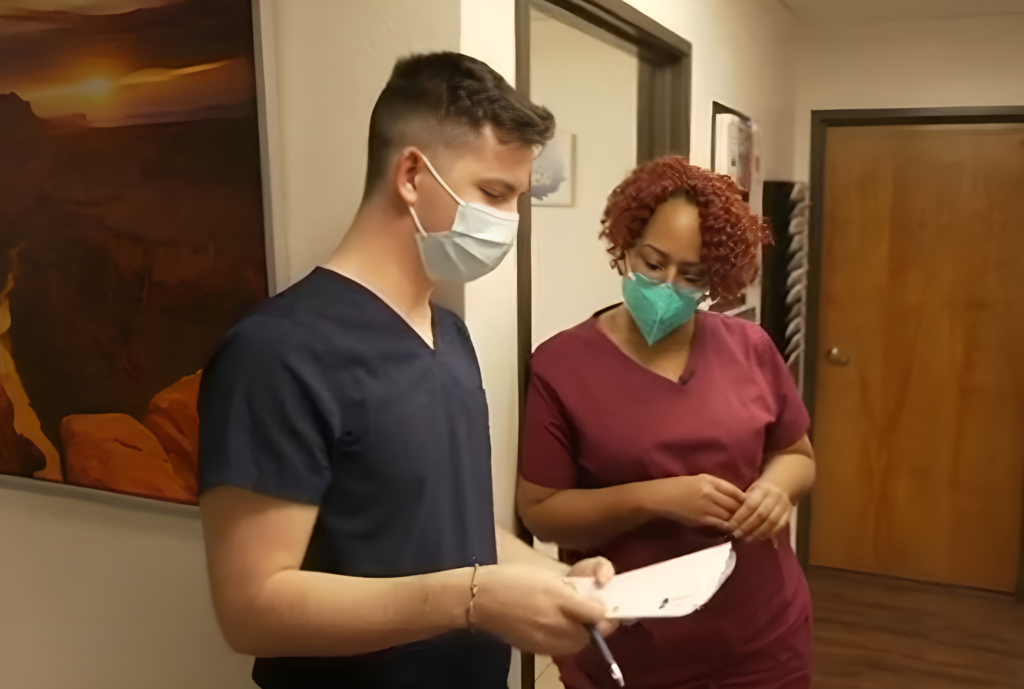By: Verdel Jones
As reproductive health care constantly changes, few voices are as compelling and transformative as Dr. Deshawn Taylor. As the founder and CEO of Desert Star Institute for Family Planning, Dr. Taylor is redefining access and equity in reproductive health services, focusing on marginalized communities. I recently had the privilege of interviewing Dr. Taylor to discuss her journey, the mission of her institute, and her vision for the future of reproductive justice.
A Vision Born from Necessity
Desert Star Institute for Family Planning was established in 2017, driven by Dr. Taylor’s vision to create equitable access to reproductive and sexual health care, focusing on Black and Indigenous communities. Her commitment to this mission is deeply rooted in her experiences as an OBGYN.
“My inspiration for founding Desert Star came from my practice experiences and the realization that the needs of underserved communities were not being met effectively within a for-profit model,” Dr. Taylor explains. “I wanted to create a space where comprehensive, respectful care could be provided to those who needed it most.”
The institute’s foundation rests on the principles of reproductive justice, which extend beyond traditional reproductive health services to include gender-affirming care and advocacy. Dr. Taylor’s journey into reproductive justice began with a personal and professional reckoning, leading her to expand the clinic’s offerings to include gender-affirming hormone therapy and a broader focus on bodily autonomy.
Decolonizing Reproductive Health
One of the most profound aspects of Dr. Taylor’s approach is her commitment to “decolonizing” reproductive health care. This concept involves challenging and redefining traditional medical practices that historically marginalized certain groups.
“I use ‘decolonize’ intentionally because the medical system is deeply rooted in a patriarchal, white male-centered model,” Dr. Taylor asserts. “As a Black woman physician, it’s crucial for me to acknowledge the historical injustices within medicine and work towards providing more inclusive and respectful care.”
Dr. Taylor cites the historical figure J. Marion Sims, often referred to as the “father of gynecology,” whose unethical experimentation on enslaved women highlights the need for a more ethical and patient-centered approach in modern practice. Dr. Taylor aims to create a medical environment sensitive to all patients’ pain and experiences by addressing these historical injustices.
Addressing Barriers to Care

Photo Courtesy: Desert Star Institute Staff
Dr. Taylor confronts the issue of affordability in reproductive health care head-on. Desert Star Institute employs innovative solutions to ensure that financial barriers do not prevent individuals from accessing necessary services.
“Our approach includes a hybrid model where we offer services on a sliding scale and accept both cash and insurance,” Dr. Taylor explains. “We also have patient assistance programs for those who qualify, allowing us to provide services like long-term birth control at no cost.”
This commitment to affordability is crucial in a healthcare system where rising costs and limited insurance coverage often leave marginalized communities without essential care. Dr. Taylor’s approach demonstrates a thoughtful balance between sustaining the clinic’s operations and ensuring that financial constraints do not compromise patient care.
Success Stories and Community Impact

Photo Courtesy: Desert Star Institute Staff
Over the years, Desert Star Institute has profoundly impacted the community it serves. Dr. Taylor shares several memorable moments that highlight the clinic’s success and the difference it has made.
“One story that stands out is from the early days of the practice when a Black woman came into the clinic and, upon seeing me, gave me a huge smile and skipped to her seat,” Dr. Taylor recalls. “It was a small but powerful reminder that our presence and the care we provide truly matter.”
Another notable achievement was launching a program to provide uninsured patients with no-cost intrauterine devices (IUDs). Thanks to partnerships with organizations like Medicines 360 and Direct Relief, the program has continued offering essential birth control options at no cost to qualifying individuals.
Despite the challenges posed by the COVID-19 pandemic and the overturning of Roe v. Wade, Desert Star Institute has persevered, supported by a strong network of funders and community members. Dr. Taylor’s dedication to keeping the clinic operational and expanding its services has been a testament to her resilience and commitment to reproductive justice.
Engaging and Educating the Community
Community education is a cornerstone of Desert Star’s mission. The institute uses various platforms to promote awareness and provide educational resources on reproductive health and justice.
“Our community education efforts include virtual workshops, social media campaigns, and in-person events,” Dr. Taylor says. “We recently hosted a session on nurturing resilient boys and masculine-identified youth as part of our broader reproductive justice framework.”
Dr. Taylor emphasizes the importance of addressing the intersectional nature of reproductive justice and engaging with the community to foster understanding and support. Desert Star aims to empower individuals and advocate for systemic change through these educational initiatives.
Staying Connected
For those interested in staying updated on Desert Star Institute’s activities, Dr. Taylor encourages following its social media channels and signing up for the newsletter on its website, https://www.desertstarfp.org/. The institute is active on Instagram, X, and Facebook, providing regular updates on its programs, events, and educational content.
Dr. Taylor’s work at Desert Star Institute for Family Planning exemplifies a compassionate and innovative approach to reproductive health care. Her commitment to equity, justice, and community engagement continues to make a significant impact, and her story serves as an inspiring model for others in the field. As she looks to the future, Dr. Taylor remains dedicated to advancing reproductive justice and ensuring everyone can access the care they need.
Published by: Khy Talara







